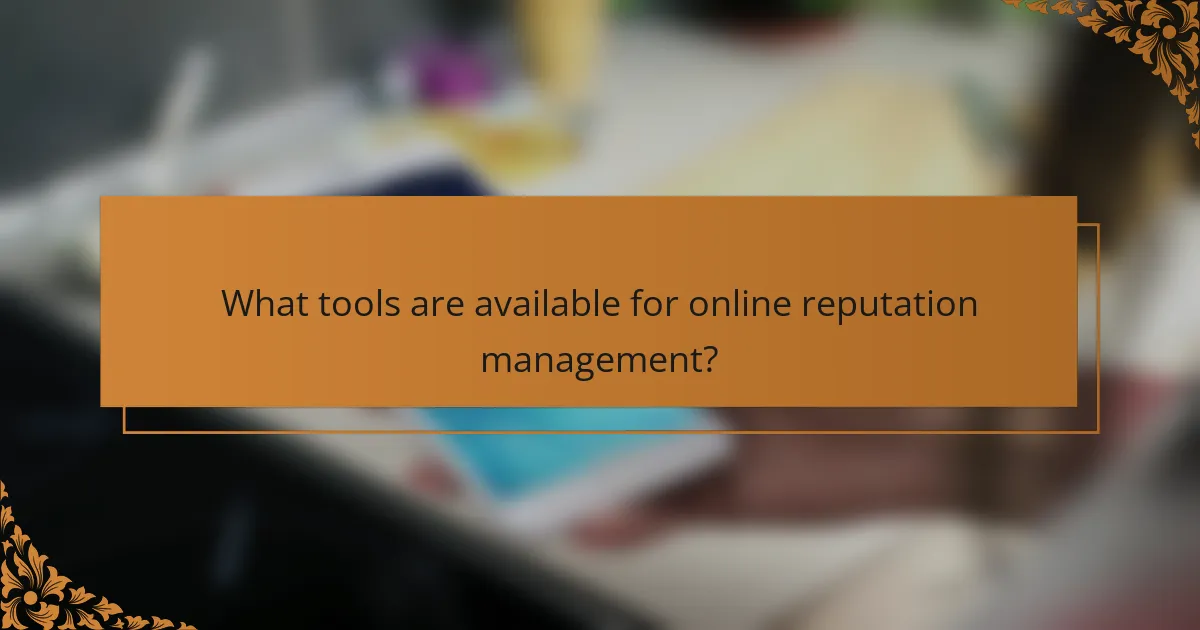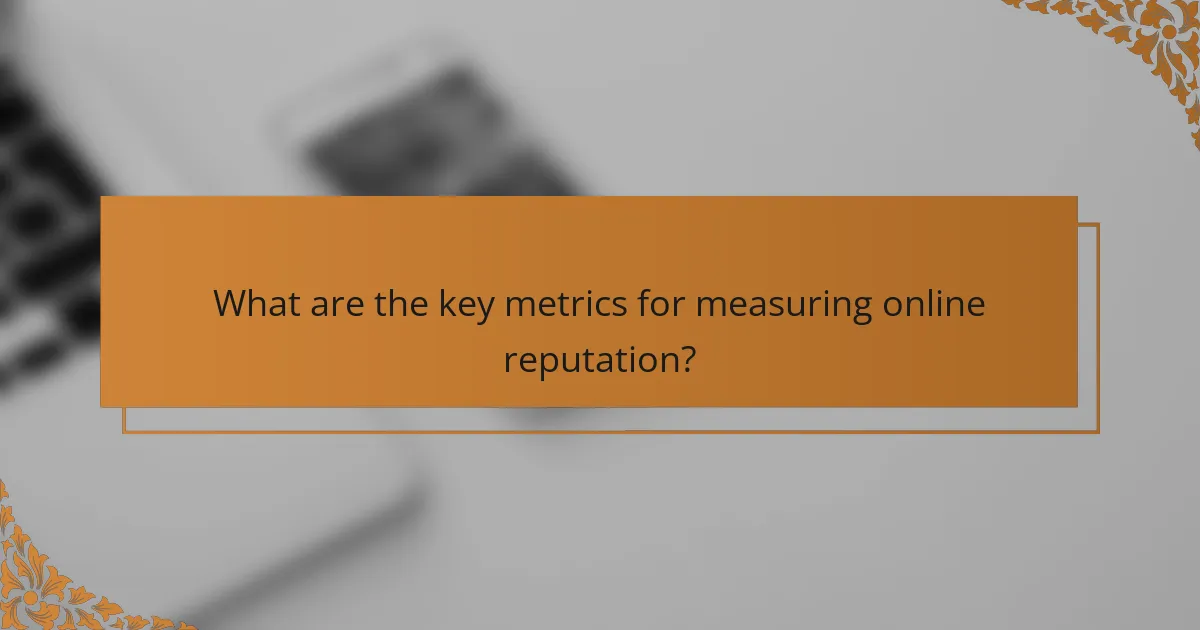Online reputation management is crucial for small businesses looking to establish a positive brand image and build customer trust. By actively engaging with customers, monitoring reviews, and utilizing effective tools, businesses can navigate the complexities of their online presence. Budgeting for these efforts ensures that resources are allocated wisely, allowing for ongoing monitoring and proactive management of potential crises.

What are effective online reputation management strategies for small businesses in the UK?
Effective online reputation management strategies for small businesses in the UK involve actively engaging with customers, monitoring reviews, managing social media, creating quality content, and preparing for potential crises. These strategies help build a positive brand image and foster customer trust.
Proactive customer engagement
Proactive customer engagement means actively reaching out to customers to build relationships and gather feedback. This can be done through personalized emails, surveys, or loyalty programs that encourage interaction. Engaging with customers not only improves satisfaction but also helps in addressing issues before they escalate.
For instance, consider implementing a feedback loop where customers can easily share their experiences. Responding promptly to inquiries or comments shows that you value their input and are committed to improving your services.
Monitoring online reviews
Monitoring online reviews is crucial for understanding public perception and addressing concerns. Small businesses should regularly check platforms like Google My Business, Trustpilot, and Yelp for new reviews. Set up alerts to stay informed about what customers are saying.
Responding to both positive and negative reviews demonstrates that you care about customer opinions. Acknowledge compliments and address complaints constructively to show potential customers that you are attentive and responsive.
Social media management
Effective social media management involves curating content, engaging with followers, and maintaining a consistent brand voice across platforms like Facebook, Twitter, and Instagram. Regularly posting updates, promotions, and engaging content keeps your audience interested and informed.
Utilize social media tools to schedule posts and analyze engagement metrics. This data can help you understand what resonates with your audience and refine your strategy accordingly. Remember to interact with followers by responding to comments and messages promptly.
Content creation and SEO
Creating high-quality content and optimizing it for search engines is essential for building a positive online reputation. This includes blog posts, articles, and videos that provide value to your audience while incorporating relevant keywords to improve visibility.
Consider developing a content calendar to plan topics that align with customer interests and seasonal trends. This approach not only boosts your search engine ranking but also establishes your business as an authority in your industry.
Crisis management planning
Crisis management planning is vital for small businesses to prepare for potential reputation-damaging events. This involves identifying possible risks, developing response strategies, and training staff on how to handle crises effectively.
Create a crisis communication plan that outlines key messages, designated spokespeople, and channels for communication. Regularly review and update this plan to ensure it remains relevant. Being prepared can help mitigate damage and restore trust quickly if a crisis occurs.

How to budget for online reputation management?
Budgeting for online reputation management involves identifying necessary expenses, allocating funds for tools, and setting aside resources for ongoing monitoring. A well-planned budget ensures that small businesses can effectively manage their online presence while controlling costs.
Identifying key expenses
Key expenses in online reputation management typically include costs for software tools, professional services, and advertising. Small businesses should consider subscription fees for reputation management platforms, costs for hiring consultants or agencies, and potential expenses for paid advertising to promote positive content.
It’s essential to categorize these expenses into one-time and recurring costs. One-time costs might include initial setup fees for tools, while recurring costs could be monthly subscriptions or ongoing service fees. Understanding these categories helps in forecasting the overall budget accurately.
Allocating resources for tools
When allocating resources for tools, small businesses should prioritize platforms that offer comprehensive features for monitoring, analysis, and response management. Popular tools may range from low-cost options under $50 per month to more advanced solutions that can exceed several hundred dollars monthly.
Consider the specific needs of your business when selecting tools. For instance, a local business may benefit from tools that specialize in managing reviews on platforms like Google or Yelp, while a larger enterprise might require more robust analytics and reporting features.
Setting up a monitoring budget
Setting up a monitoring budget is crucial for maintaining an active online presence. Allocate funds for regular checks of your brand’s online reputation, which can be done through automated tools or manual searches. A monthly budget of around $100 to $300 can provide a good balance between thorough monitoring and cost-effectiveness.
Additionally, consider the frequency of monitoring. Daily checks may be necessary during a crisis, while weekly or monthly reviews might suffice during stable periods. Adjust your budget based on the level of activity and engagement your business experiences online.

What tools are available for online reputation management?
Several tools are available for online reputation management, each designed to help businesses monitor and improve their online presence. These tools can track mentions, manage social media, and analyze customer feedback, making them essential for small businesses aiming to maintain a positive reputation.
Google Alerts
Google Alerts is a free tool that allows businesses to monitor the web for specific keywords, such as their brand name or relevant industry terms. By setting up alerts, you can receive notifications whenever new content is published that includes your chosen keywords, helping you stay informed about your online reputation.
To use Google Alerts effectively, choose keywords that accurately reflect your brand and its offerings. Regularly review the alerts you receive to identify potential issues or opportunities for engagement. This proactive approach can help you address negative mentions before they escalate.
Hootsuite
Hootsuite is a social media management platform that enables businesses to schedule posts, engage with followers, and monitor brand mentions across various social networks. It provides a centralized dashboard for managing multiple accounts, making it easier to maintain a consistent online presence.
When using Hootsuite, take advantage of its analytics features to track engagement metrics and audience sentiment. This data can inform your content strategy and help you respond to customer feedback promptly. Consider using Hootsuite’s listening tools to identify trends and conversations relevant to your brand.
Reputation.com
Reputation.com is a comprehensive reputation management platform that focuses on improving online reviews and customer feedback. It offers tools for monitoring reviews across multiple sites, responding to customer comments, and enhancing your overall online image.
For small businesses, leveraging Reputation.com can streamline the process of managing customer interactions. By actively engaging with reviews and addressing concerns, you can foster a positive reputation and build customer loyalty. The platform also provides insights into customer sentiment, helping you make data-driven decisions.
BrandYourself
BrandYourself is a personal branding tool that helps individuals and businesses improve their online presence by optimizing search results and managing online profiles. It focuses on creating a positive digital footprint and can be particularly useful for small business owners looking to enhance their visibility.
To get started with BrandYourself, create a profile that highlights your strengths and achievements. The platform offers guidance on improving your online presence through content creation and reputation monitoring. Regularly updating your profile and engaging with your audience can help you maintain a strong online reputation.

What are the key metrics for measuring online reputation?
Key metrics for measuring online reputation include review ratings, social media engagement, and brand mentions. These metrics provide insights into how customers perceive a business and can guide strategies for improvement.
Review ratings
Review ratings are numerical scores given by customers based on their experiences with a business. These ratings typically range from one to five stars and are crucial for attracting new customers. A higher average rating can significantly enhance a business’s credibility and visibility.
To effectively monitor review ratings, regularly check platforms like Google My Business, Yelp, and industry-specific sites. Aim to maintain an average rating of at least four stars, as this is often considered the threshold for consumer trust.
Social media engagement
Social media engagement measures how actively customers interact with a brand’s content on platforms like Facebook, Instagram, and Twitter. Key indicators include likes, shares, comments, and overall follower growth. High engagement levels often correlate with a positive online reputation.
To boost social media engagement, consistently post relevant content and respond promptly to comments and messages. Aim for a posting frequency of at least three times a week to keep your audience engaged and informed.
Brand mentions
Brand mentions refer to instances where a business’s name is mentioned online, whether in articles, blogs, or social media posts. Tracking these mentions helps gauge public sentiment and identify potential issues before they escalate. Tools like Google Alerts or Mention can assist in monitoring brand mentions effectively.
To enhance brand visibility, encourage satisfied customers to share their experiences online. Regularly engaging with both positive and negative mentions can help shape a favorable reputation and demonstrate that the business values customer feedback.

What are common challenges in online reputation management?
Small businesses often face several challenges in online reputation management, including negative reviews, lack of visibility, and difficulty in responding to customer feedback. These issues can significantly impact customer trust and overall business success.
Negative Reviews
Negative reviews can severely damage a small business’s reputation. They often spread quickly and can deter potential customers. Addressing these reviews promptly and professionally is crucial to mitigate their impact.
To manage negative feedback effectively, consider implementing a structured response strategy. Acknowledge the issue, apologize if necessary, and offer a solution. This approach demonstrates to potential customers that you value feedback and are committed to improvement.
Lack of Visibility
Many small businesses struggle with online visibility, making it difficult for customers to find them. This challenge can stem from poor search engine optimization (SEO) or inadequate presence on social media platforms.
To enhance visibility, focus on optimizing your website for search engines by using relevant keywords and creating quality content. Additionally, actively engaging on social media can help increase your reach and attract more customers.
Difficulty in Responding to Customer Feedback
Responding to customer feedback, both positive and negative, can be overwhelming for small businesses with limited resources. However, timely and thoughtful responses are essential for maintaining a good reputation.
Establish a feedback management system to streamline responses. This could include setting aside specific times each week to address reviews and comments. Utilizing tools that aggregate feedback from various platforms can also save time and ensure no comment goes unanswered.
